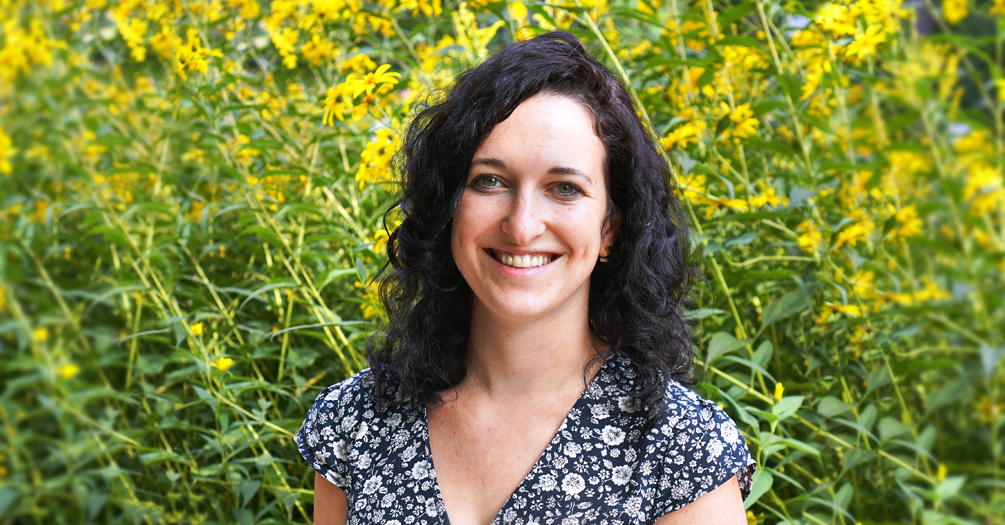Digging deeply in epidemiology: Young disease detective finds her home

Nina Masters, MPH ’18, PhD ’21
Epidemiology
Nina Masters is living the dream of her 8-year-old self, who enjoyed reading books like “The Hot Zone” after school.
Growing up in Manhattan, she cultivated her science interests by attending classes and camps at the American Museum of Natural History and loved problem solving when it came to infectious disease transmission.
Even though today she has her dream job as an epidemic intelligence service officer in the Viral Vaccine Preventable Diseases Branch at the Centers for Disease Control and Prevention in Atlanta, her path has included many pivots.
Masters always thought she wanted to be a lab scientist, but while completing her senior thesis work in materials science and engineering at Princeton University, she realized she didn’t love it.
“That pivot helped—in the long run—get me where I am,” she said.
That same year, a meningitis B outbreak at Princeton prompted emergency authorization of the Bexsero vaccine for the students. Although vaccination coverage was very high among students, some students hesitated or were not vaccinated.
Until this experience, Masters wanted to make vaccines. Through this experience, however, she “realized you can have the best vaccine in the world, and it doesn't matter if no one takes it. It was a really important transition moving from bench science to the public health side.”
After Princeton, Masters worked in life sciences consulting and at a biotechnology startup.
Consulting was “a baptism by fire in which I learned how the world works,” she said.
At both jobs, she learned about epidemiology, first by doing market-sizing work.
“It was back-of-the-envelope, hack epidemiology but it got me interested in population demographics, risk factors, and disease,” Masters said.
Neither job was quite right, but she found epidemiology through them.
When Masters looked for a public health program, the University of Michigan School of Public Health stood out because of its strong modeling faculty.
“I was interested in the person-to-person aspect, and the problem-solving, tracing, detective-work side of things,” she said of recognizing her affinity for disease dynamics.
Also, with her background in engineering and math, she believed she would feel at home in modeling.
As a PhD pre-candidate in Epidemiology, Masters became “over-the-top interdisciplinary.” She pulled in mentors from other fields, including a geographer from North Carolina, and became fascinated with spatial epidemiology.
“Disease happens to a person, in a place, and at a time—often we remember the person but we forget the place and time,” said Masters, whose dissertation focused on measles and vaccine-preventable diseases.
I feel lucky I was able to take forward my interest in those areas and learn about it more from the public health practice side.”
Masters strove to find the level at which data is most meaningful. For example, she explained that measles vaccination coverage is often listed with a single number for a whole country, but things do not happen on a national scale.
“Transmission happens when you sit in a coffee shop and cough on someone, go to the grocery store, or get on a bus,” she said. “I became obsessed with finding the right scale to look at vaccination coverage. It needs to be informative about actual disease and transmission risk, but also not so computationally intensive that we’ll never be able to measure it.”
Michigan Medicine’s Susan B. Meister Child Health Evaluation and Research Center awarded Masters the 2022 Susan B. Meister Award for Best Paper in Child Health Policy. The winning paper identified clusters of unvaccinated children before and after a 2014 Michigan rule change requiring parents to attend an in-person vaccine education class before receiving an exemption.
“If you look at the one year, it looked like it was a great success, but if you zoom out, the policy change wasn’t quite a big enough hurdle to change the equation for parents,” she said. “I was honored to do this research with an all-star team of co-authors and mentors.”
Masters said School of Public Health advisors Matthew Boulton and Jon Zelner had a significant impact on her work.
“Matt had been in public health practice for a long time,” she said. “He kept me aware that research priorities should focus on actionability. Jon taught me how to be a modeler. He spent hours with me debugging code and thinking about problems. They highlighted very different parts of my brain, but they were both very influential.”
In contrast to the “machismo” culture Masters remembered as the only woman in her lab early in her career, in public health she feels represented.
Epidemiology is unique because it's a computationally intensive field with a lot of badass, superstar, female mentors.”
